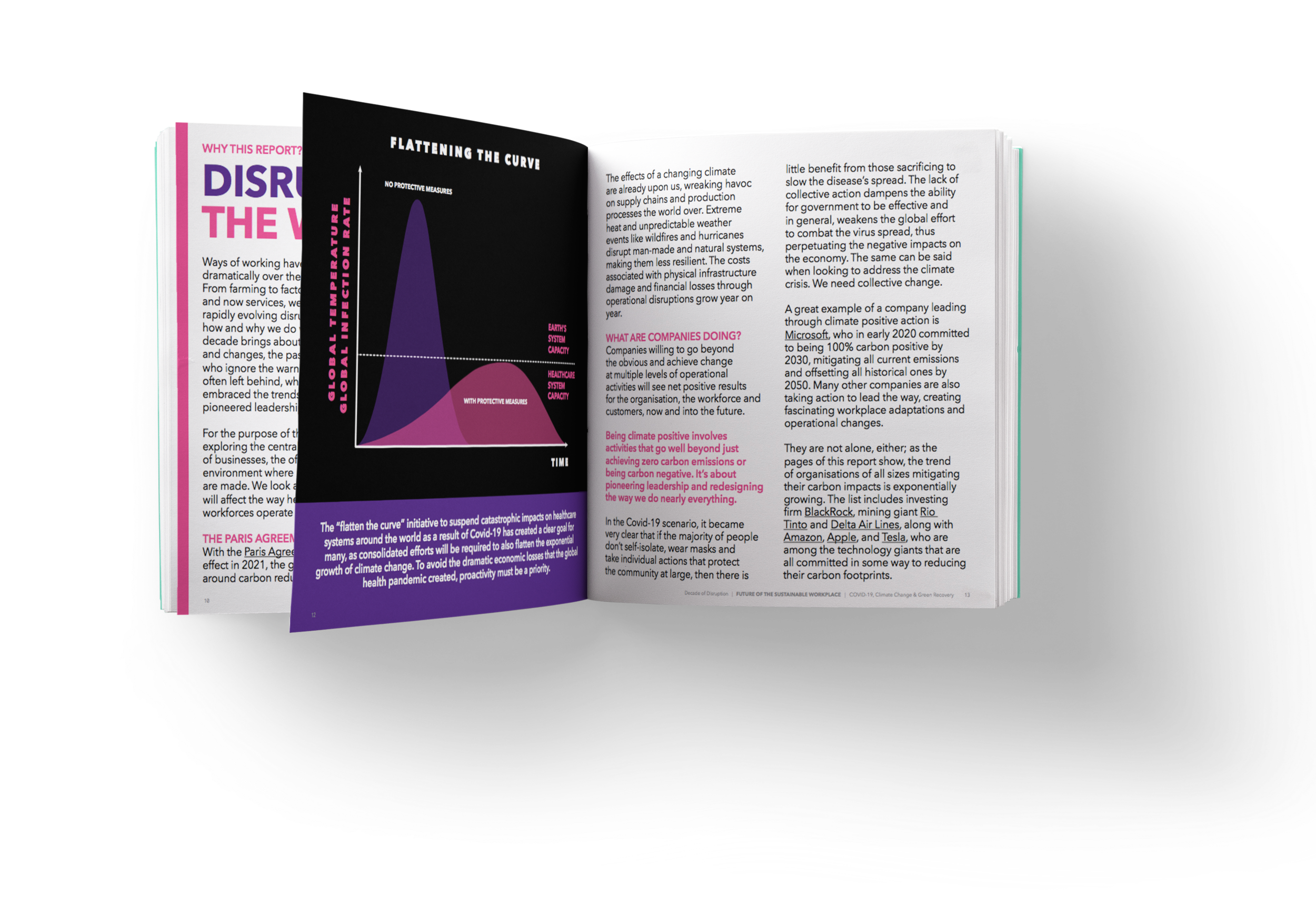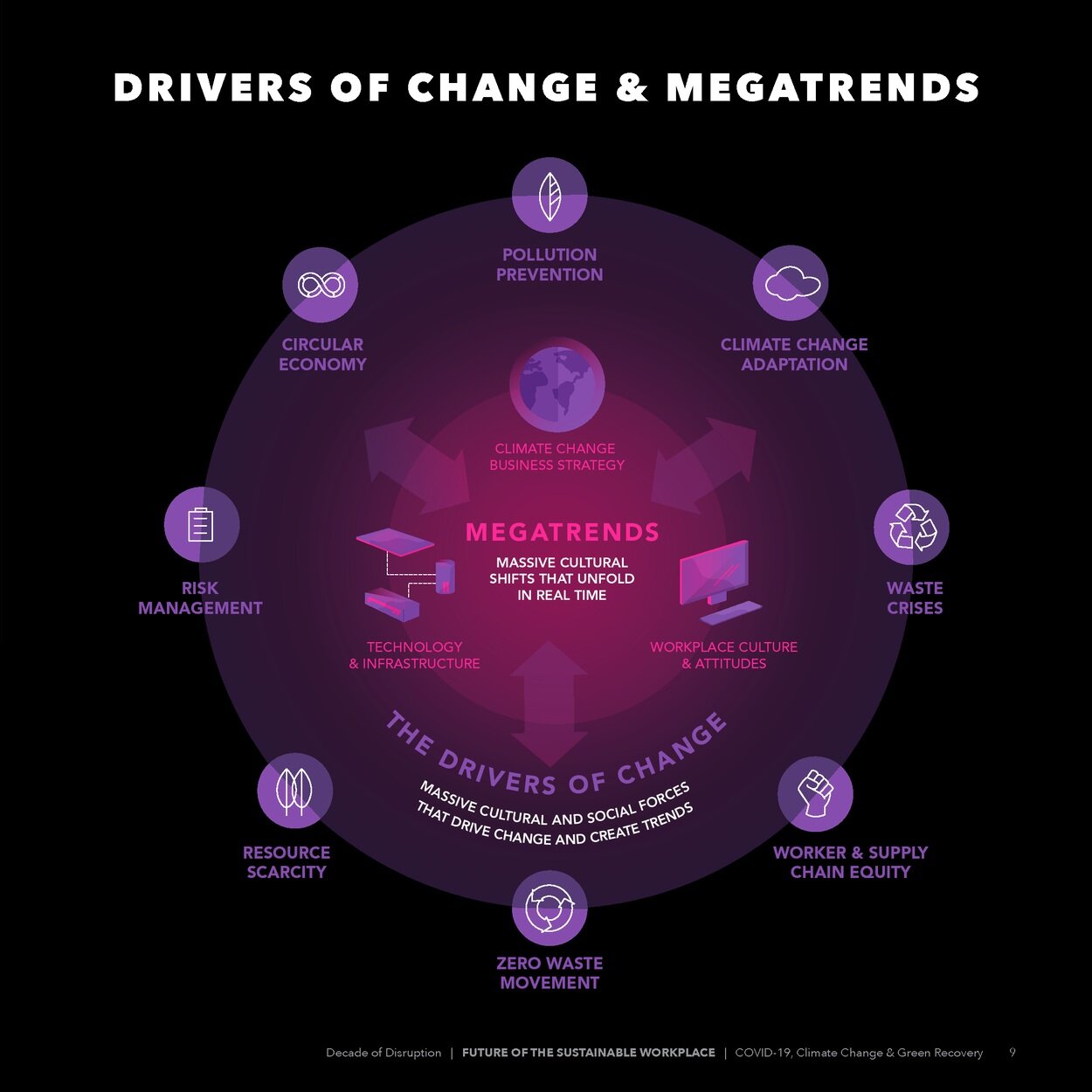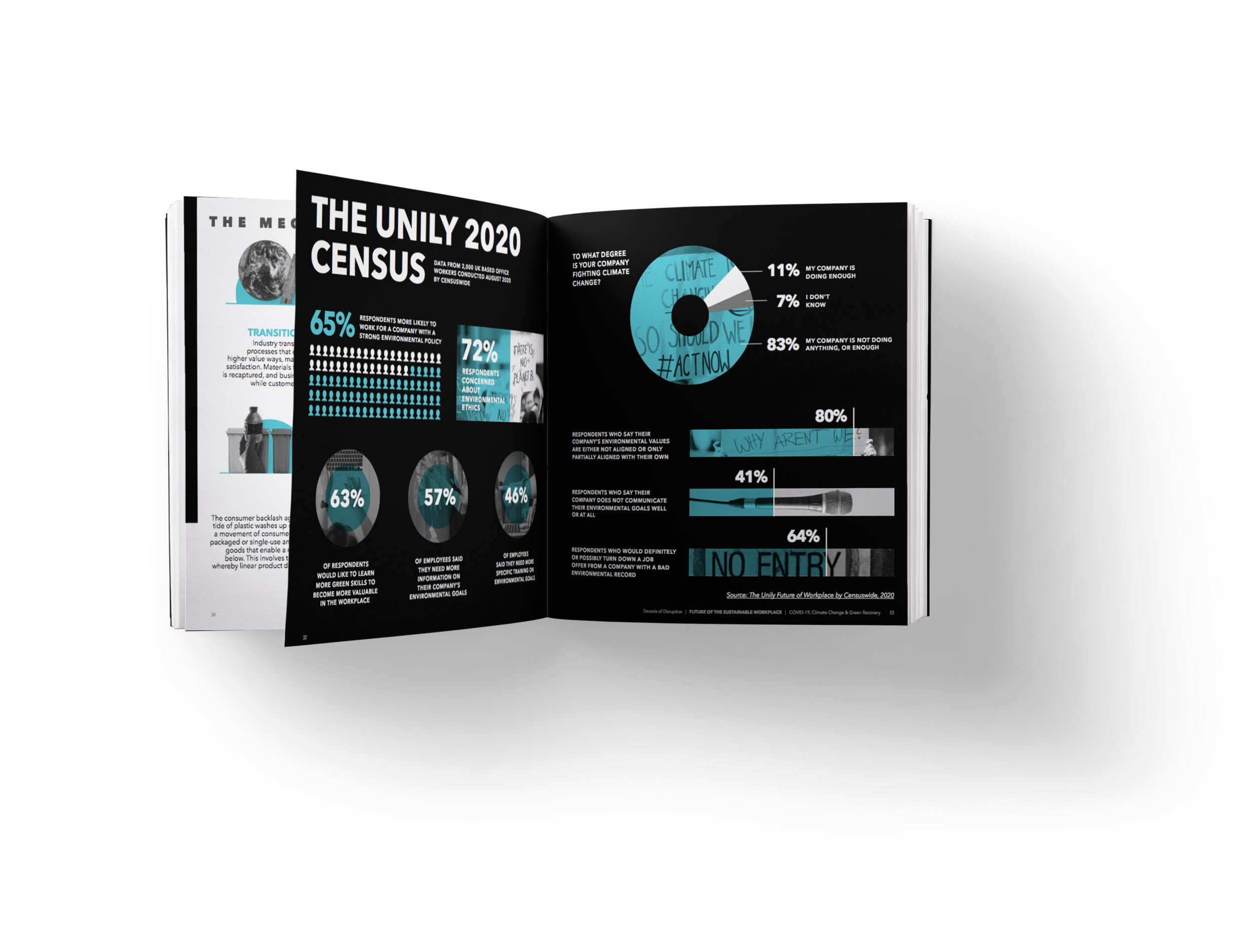Last week, we shared the exciting launch of our groundbreaking report, Decade of Disruption: Future of the Sustainable Workplace in the Age of Covid-19 and Climate Change, written by Leyla Acaroglu and commissioned by Unily.
Over the next few weeks, we’ll be sharing highlights from each of the three parts of the report, starting with Part 1, The Sustainability Status. If you’re keen to dive into the full report right now, go ahead and download it in full here — it’s totally free! And, if you are ignited to start your workplace sustainability journey, then take one of our Sustainability in Business Programs or week-long intensive.
This opening section of the report gives you a 360 degree perspective of the trends and forces influencing the transition towards sustainability in the workplace by exploring the opportunities and actions that are currently emerging as the defining forces shaping the transition to carbon positive and sustainable workplaces.
THE DECADE OF DISRUPTION: 2020-2030
The last two decades have seen a rise in “green” office strategies that range from assessing the energy, waste and water consumption through to sustainable procurement and behavioral change initiatives, but now we are seeing the elevation of change towards business model transformation for the circular economy.
This decade was already set up to be one of great change even before the crises of early 2020. Transformation of both the entire economy and social practices was accelerated by the global pandemic that swept around the world, wreaking havoc on markets, changing business operations, altering people's lives and challenging healthcare systems. The Covid-19 crisis is emerging entirely new ways of working, living and doing business. But even before this, the foundations for massive change were already being laid out for businesses. Here we explore some of the great disruptions unfolding this decade.
INDUSTRY 4.0
We are in the midst of a fourth industrial revolution. Industry 4.0 is fueled by digital transformation, Artificial Intelligence, robotics and networked communication systems. Exponential changes in technological development alters the way we manufacture, produce and consume goods and operate within the economy. The interconnection of devices and services so that technology communicates to enable the more efficient and seamless creation of goods, along with the rapid growth in connectivity, is creating entirely new ways of doing things. Offices, factories, cities and homes are getting ‘smarter,’ which when designed well, can lead to significant efficiency and productivity gains.
“This manufacturing revolution will increase productivity, shift economics, foster industrial growth, and modify the profile of the workforce”. - Industry 4.0, BCG
The Circular Economy
In response to the waste and pollution crisis, the Circular Economy calls for a total reconstruction in the way we design, deliver and engage with the goods and services that make up the economy. This involves moving from a linear production process - whereby waste and pollution are built into production systems - to a circular one that allows for new business models, design processes and supply chains that cycles resources through a well-designed closed loop system. Products become services and entire value-chains are redesigned and managed to eliminate losses and increase the value of materials extracted from nature.
“Adopting circular-economy principles could not only benefit Europe environmentally and socially but could also generate a net economic benefit of €1.8 trillion by 2030”. - EU Circular Economy Action Plan, Mckinsey and Company
Climate Change
Humans have long had an obsession with tracking the weather. For much of our history, the ability to predict the weather has helped us build, feed and navigate societal development. The current and predicted changes that will occur this decade if we do not curb global greenhouse gas emissions will make reading the weather have an entirely new meaning as we see more freak weather events, longer, hotter summers, increased frequency of catastrophes and rising sea levels impact coastal regions. The degree of impact will depend on the actions taken now, and with nearly all countries in the world ratifying the 2016 Paris Agreement, there is hope that the worst will be avoided and the best brought out in our global community.
“Ambitious climate action could generate US$26 trillion in economic benefits between now and 2030 and create 65 million jobs by 2030, while avoiding 700,000 premature deaths from air pollution” - New Climate Economy: Commission on the Economy and Climate
2030 Global Goals
The United Nations has marked the end of this decade as the goalpost year for achieving the Sustainable Development Goals (SDGs). The SDGs are a set of 17 global goals that, if achieved, will bring about a sustainable and equitable economy. Many companies are adopting the SDGs as operating guidelines for corporate activity, Despite there still being disconnects between rhetoric and action, there is a strong drive for this decade to be one where global action on sustainable development is made and successes achieved.
“Our analysis shows 72% of companies mentioned the SDGs in their reporting, but only 25% include them in their published business strategy. Furthermore, just 14% include specific SDG targets”. - Welcome to the 2020s: The 'make or break' era of sustainable development, PwC
Global Health Crises
The World Health Organization has long been calling for concern over the threat of global health pandemics, and the Covid-19 crisis has certainly changed the way we live and work. The long term impacts are unknown, as is the potential for an increase in pandemics in the future. The crisis has drawn many parallels to the needed action in combating climate change, as the response to the Covid-19 reminded many that action to abate the negative impacts of climate change also requires collective action. The connection between the destruction of nature and the increased risk of pandemics has been raised by leading biodiversity experts. There’s a likelihood that the coronavirus pandemic will be followed by even more destructive disease outbreaks if the cause behind the continuous destruction of natural capital does not come to a halt.
“Many of the root causes of climate change also increase the risk of pandemics. Deforestation, which occurs mostly for agricultural purposes, is the largest cause of habitat loss worldwide. Loss of habitat forces animals to migrate and potentially contact other animals or people and share germs” -Coronavirus and Climate Change, Harvard Medical School
The Green Recovery
The Covid19 fueled economic crises will be built on a green recovery plan, especially in Europe where the European Union is driving the campaign to build back better. The United Nations Secretary-General, António Guterres, proposed six climate-related actions to shape the recovery post Covid-19 in a call to action for governments to build more resilient, sustainable and inclusive societies. Aiming for carbon neutrality by 2050 and the protection of biodiversity, the green recovery plan outlines:
Monetary recovery packages that deliver new jobs and businesses through a clean and green transition.
When taxpayers’ money is being used to rescue businesses, it should be tied to achieving green jobs and sustainable growth.
The use of fiscal firepower to drive a shift from the current grey to a green economy, empowering societies and people to be more resilient.
Public funds should be used to invest in the future and flow to sustainable sectors and projects that help the environment and the climate by ending fossil fuel subsidies and encouraging polluters to pay for the impacts that they create.
Climate risks and opportunities are to be incorporated into the financial system at large, as well as all aspects of public policy making and infrastructure.
What else is in Part 1?
The rest of Part 1 dives into the megatrends impacting this decade of disruption. Megatrends are massive cultural shifts that unfold in real time, creating identifiable patterns that can be observed and interacted with as they emerge and evolve to affect society at large.
We identified 8 societal level megatrends that are affecting the ways we work and the types of business models that will be successful in the future, all of which are covered in detail in the full report. The future is changed by our actions today, so these trends are a manifestation of the behaviors, desires, aspirations and actions of those operating in the workforce and business world right now.
We also share the results of a survey of 2000 UK-based office workers, from graduate entry level jobs through to Senior Manager level, who were surveyed by Censuswide in August 2020. A range of questions relating to the impact of Covid, their perceptions of sustainability and work life changes were presented, and Part 1 captures fascinating insights from select data responses.



















